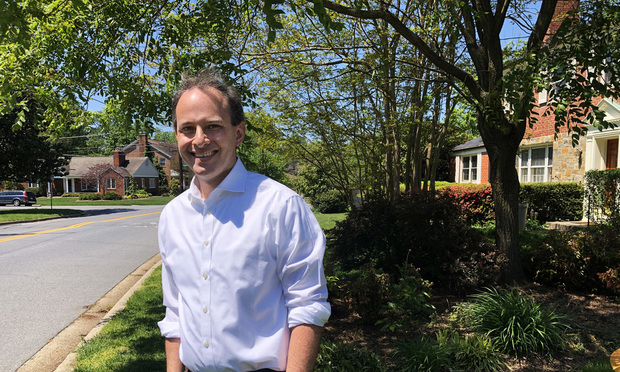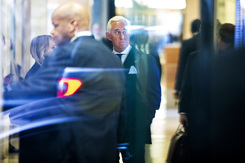Former Roger Stone Prosecutor Discusses Tackling Public Corruption in New Role
Jonathan Kravis sets local campaign finance law enforcement in his sights.
May 30, 2020 at 09:00 AM
7 minute read
 Jonathan Kravis, special counsel for public corruption at the Office of the Attorney General for the District of Columbia. May 7, 2020.
Jonathan Kravis, special counsel for public corruption at the Office of the Attorney General for the District of Columbia. May 7, 2020.
Last winter, as Karl Racine looked ahead to the rest of his second term as the District of Columbia's attorney general, he turned his attention to an early priority that had gone unaddressed in his first four years in office.
After spending that first term developing "a bit of credibility," he said, as the district's first elected attorney general, Racine determined it was time to build a public corruption section tasked with targeting bribery, fraud and campaign violations. "And I immediately went to my handy-dandy Rolodex," Racine said, to consult current and former prosecutors on whom he might attract to advise his office on "what a public corruption or public integrity section might look like."
In those conversations, he kept hearing the name Jonathan Kravis. At the time, Kravis was a well-regarded deputy chief of the fraud and public corruption section of the U.S. Attorney's Office in Washington, D.C., with a caseload headlined by high-profile prosecutions inherited from former Special Counsel Robert Mueller III's team. But he would soon become available. In early February, months after playing a lead role in the prosecution of Roger Stone, Kravis resigned in protest of the Justice Department leadership intervening in the case to recommend a more lenient sentence for the longtime confidant of President Donald Trump.
A colleague in the U.S. Attorney's Office mourned Kravis' departure as "a loss to the pursuit of justice in this country." But Racine saw an opportunity. In April, Kravis joined the attorney general's office as special counsel for public corruption, a three-month consulting role in which he will advise Racine on structuring a new division and on any legislation needed to empower it. "I think it was a matter of just really perfect timing. I don't want to be trite on that. But the timing worked perfectly for us and the launch," Racine said.
Kravis will be paid $58,333 in his role as special counsel for public corruption, which is set to end July 12, a representative for the attorney general's office said. For Kravis, it was an opportunity to ease into the next stage of his career following a sudden, tumultuous exit from the Justice Department. In an early May interview, Kravis declined to discuss his role in the Stone case. Later, in a Washington Post op-ed published on May 11, Kravis stated: "I resigned because I was not willing to serve a department that would so easily abdicate its responsibility to dispense impartial justice."
Kravis, a former Supreme Court clerk and Williams & Connolly associate, said the "chance to work with the D.C. attorney general on this project is much more attractive than immediately going to work in private practice or immediately pursuing some other opportunity."
"I spent the last 10 years of my career working at DOJ. I spent the last five years working on public corruption, and all of that ended fairly abruptly," Kravis said. "To have the opportunity to continue for at least a little while making a contribution to that effort by helping the office of the attorney general with this very important project, it was a real boon for me. It was a really good fit. And I'm really glad that Karl found me."
 Former Trump advisor Roger Stone, indicted by the team of Special Counsel Robert Mueller, arrives at Federal Court for his arraignment hearing in Washington, D.C., on Tuesday, January 29, 2019.
Former Trump advisor Roger Stone, indicted by the team of Special Counsel Robert Mueller, arrives at Federal Court for his arraignment hearing in Washington, D.C., on Tuesday, January 29, 2019.Kravis' move to the attorney general's office was met with questions from former prosecutors about what exactly he might be able to accomplish. In Washington, the U.S. Attorney's Office handles the vast bulk of criminal law enforcement, with the local attorney general's prosecution portfolio largely limited to juvenile and traffic offenses.
Still, former prosecutors in Washington said Kravis could find areas apart from criminal prosecution where the district could strengthen its policing of local corruption.
"Unless there's some statutory change by Congress, [Kravis is] not going to the D.C. attorney general's office to prosecute criminal corruption. That's handled by the office he used to be in," said Randall Eliason, a professor at the George Washington University Law School who previously served as the top public corruption prosecutor in the U.S. Attorney's Office in Washington.
"That being said, I think there's a lot he can do that would be really helpful," such as identifying reforms to district laws and positioning the attorney general's office to bring more civil suits and collaborate more closely with the U.S. Attorney's Office in public corruption cases, Eliason added.
"If I were in the U.S. Attorney's Office, I'd see this as a really positive development," Eliason said.
Tackling Corruption
Kravis said he had identified efforts the attorney general's office could take up "right now in the public corruption space" without legislative reform from Congress or the D.C. Council. He pointed to the attorney general's authority to seek fines and even criminal penalties for violations of the district's campaign finance laws, along with the office's civil enforcement authority over nonprofit organizations in the district.
Kravis said he envisioned the attorney general's office complementing the public corruption prosecutions brought by the U.S. Attorney's Office. Of that office, he said, "their public corruption work is almost exclusively on the federal district court side and is quite properly focused on investigating and prosecuting federal crimes."
"That's their mandate, that's what they're there to do. But the consequences of that is there is a set of local public corruption offenses that just don't get enforced in the District of Columbia. Is that because people really think that nobody has committed a campaign finance violation in the District of Columbia in the last 15 years?" he said.
"There's another crime, a D.C. Code crime, that criminalizes written false statements to the D.C. government under certain circumstances. Again, this provision is almost never enforced. Is it because no one is making false statements to the District of Columbia government in writing? I don't think that's true. I think it's because there is just not a local public corruption enforcement authority in this jurisdiction right now."
With a public integrity section, Racine said he hopes to align his office with those of state attorneys general, and no longer making the District of Columbia a jurisdiction "that does not have a local entity who is authorized to actually criminally prosecute matters related to public integrity and corruption." The effort, he said, also reflects his office's sensitivity to another way the district stands out: Its U.S. Attorney's Office has the distinction of being the largest in the country, with a mandate to prosecute not only "all federal offenses but also local offenses."
"There is a reality that they are the largest office in the country, they are the only office in the country that not only has a mandate to prosecute all federal offenses but also local offenses. That's a lot. I would argue that's far too much, and that the local jurisdiction is doing far too little," Racine said. "And that's why we're doing this."
This content has been archived. It is available through our partners, LexisNexis® and Bloomberg Law.
To view this content, please continue to their sites.
Not a Lexis Subscriber?
Subscribe Now
Not a Bloomberg Law Subscriber?
Subscribe Now
NOT FOR REPRINT
© 2025 ALM Global, LLC, All Rights Reserved. Request academic re-use from www.copyright.com. All other uses, submit a request to [email protected]. For more information visit Asset & Logo Licensing.
You Might Like
View All
Skadden and Steptoe, Defending Amex GBT, Blasts Biden DOJ's Antitrust Lawsuit Over Merger Proposal
4 minute read
Does the Treasury Hack Underscore a Big Problem for the Private Sector?
6 minute read
Big Law Practice Leaders Gearing Up for State AG Litigation Under Trump
4 minute read
'Religious Discrimination'?: 4th Circuit Revives Challenge to Employer Vaccine Mandate
2 minute readLaw Firms Mentioned
Trending Stories
Who Got The Work
J. Brugh Lower of Gibbons has entered an appearance for industrial equipment supplier Devco Corporation in a pending trademark infringement lawsuit. The suit, accusing the defendant of selling knock-off Graco products, was filed Dec. 18 in New Jersey District Court by Rivkin Radler on behalf of Graco Inc. and Graco Minnesota. The case, assigned to U.S. District Judge Zahid N. Quraishi, is 3:24-cv-11294, Graco Inc. et al v. Devco Corporation.
Who Got The Work
Rebecca Maller-Stein and Kent A. Yalowitz of Arnold & Porter Kaye Scholer have entered their appearances for Hanaco Venture Capital and its executives, Lior Prosor and David Frankel, in a pending securities lawsuit. The action, filed on Dec. 24 in New York Southern District Court by Zell, Aron & Co. on behalf of Goldeneye Advisors, accuses the defendants of negligently and fraudulently managing the plaintiff's $1 million investment. The case, assigned to U.S. District Judge Vernon S. Broderick, is 1:24-cv-09918, Goldeneye Advisors, LLC v. Hanaco Venture Capital, Ltd. et al.
Who Got The Work
Attorneys from A&O Shearman has stepped in as defense counsel for Toronto-Dominion Bank and other defendants in a pending securities class action. The suit, filed Dec. 11 in New York Southern District Court by Bleichmar Fonti & Auld, accuses the defendants of concealing the bank's 'pervasive' deficiencies in regards to its compliance with the Bank Secrecy Act and the quality of its anti-money laundering controls. The case, assigned to U.S. District Judge Arun Subramanian, is 1:24-cv-09445, Gonzalez v. The Toronto-Dominion Bank et al.
Who Got The Work
Crown Castle International, a Pennsylvania company providing shared communications infrastructure, has turned to Luke D. Wolf of Gordon Rees Scully Mansukhani to fend off a pending breach-of-contract lawsuit. The court action, filed Nov. 25 in Michigan Eastern District Court by Hooper Hathaway PC on behalf of The Town Residences LLC, accuses Crown Castle of failing to transfer approximately $30,000 in utility payments from T-Mobile in breach of a roof-top lease and assignment agreement. The case, assigned to U.S. District Judge Susan K. Declercq, is 2:24-cv-13131, The Town Residences LLC v. T-Mobile US, Inc. et al.
Who Got The Work
Wilfred P. Coronato and Daniel M. Schwartz of McCarter & English have stepped in as defense counsel to Electrolux Home Products Inc. in a pending product liability lawsuit. The court action, filed Nov. 26 in New York Eastern District Court by Poulos Lopiccolo PC and Nagel Rice LLP on behalf of David Stern, alleges that the defendant's refrigerators’ drawers and shelving repeatedly break and fall apart within months after purchase. The case, assigned to U.S. District Judge Joan M. Azrack, is 2:24-cv-08204, Stern v. Electrolux Home Products, Inc.
Featured Firms
Law Offices of Gary Martin Hays & Associates, P.C.
(470) 294-1674
Law Offices of Mark E. Salomone
(857) 444-6468
Smith & Hassler
(713) 739-1250










